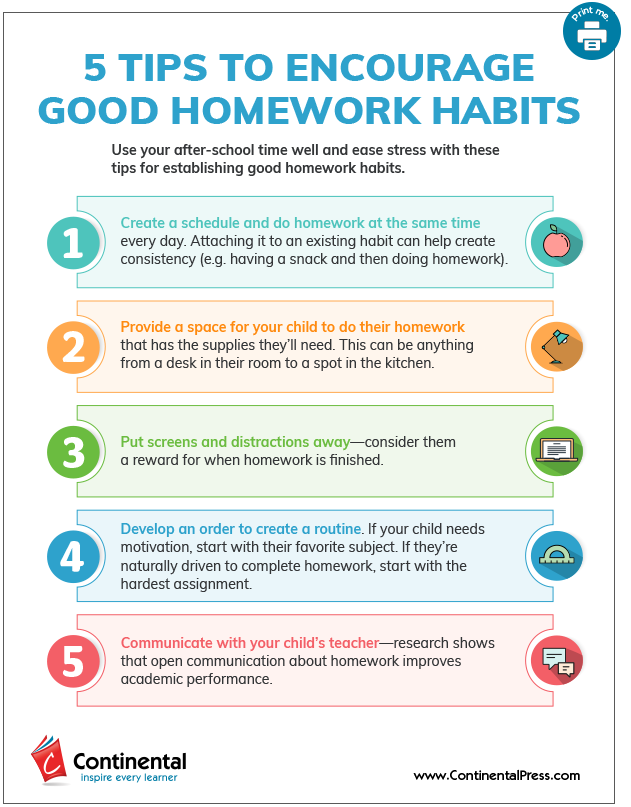How to Establish Good Homework Habits for Kids
Homework is the bridge between the home and the classroom. It reinforces what’s learned at school and can help raise red flags in subjects where children need extra help. It is crucial to establish good homework habits for kids early when the homework assignments are short and simple.
On the other hand, bad homework habits can lead to a negative attitude toward learning and difficulties staying focused on longer tasks. Here are our top tips for how to develop good homework habits for kids, as well as a few quick fixes to remedy bad homework habits.
Five Good Homework Habits for Kids
Start by building a foundation of good homework and study habits that dictate where, when, and how homework should be done. Here are six of the best homework habits you can help your child establish.
1. Set a Homework Schedule
One of the easiest ways to help your child develop their best homework habits is to set aside homework time each day. Having daily homework time will prevent procrastination and ensure that your child is on track to finish his work on time.
Some children may prefer to do homework as soon as they get home. Others may need some time to play and burn off energy before settling in with their assignments. If your schedule changes daily with after-school sports and activities, consider instituting homework rules instead. For example, your child might have to do his homework before having any screen time.
Setting a schedule will help homework become a regular part of the day, rather than a daily disagreement between you and your child.
2. Provide a Regular Homework Space
Another important part of establishing a regular homework schedule is providing your child with a space to do her homework. Older students may enjoy having a desk with storage for supplies and a large space to work.
Younger children who need more help with their homework may prefer working at the kitchen table or in another communal space in the house. This can be especially helpful when your child is working on subjects or tasks that he struggles with.
Wherever your child is most comfortable, make sure he has the room and supplies he needs to develop good homework and study habits.
3. Assist Your Child (But Not Too Much!)
One of the trickiest parts of establishing good homework habits for kids is deciding how much help they need. Some parents may be tempted to rush over the moment they see their child is getting frustrated. However, it is important for students young and old to challenge themselves and work through frustration.

At the first complaint or sign of frustration, encourage your child to keep trying. Here are a few easy ways to keep him moving on a tricky question or assignment:
- Ask if he has completed all the sections he understands before tackling the ones he doesn’t.
- Provide encouragement and praise when she makes a step in the right direction.
- Ask what she remembers from class that might help her.
- Determine if there are additional resources he may need, words he needs to have defined, or directions he needs to have clarified.
There will certainly be times when your child will need help, but homework is designed to reinforce skills and subjects taught in class. Doing your child’s homework or helping her too much will only hurt her learning in the long run.
4. Stay Positive and Confident
Keeping your cool will help homework become a positive opportunity for students to practice the skills they learn in the classroom. It’s also your chance to see what your child is learning and make sure he has the tools he needs to succeed.
Praise your child not only when she gets the answer right away, but when she struggles and perseveres. Remaining confident in her abilities throughout the process is key to her own self-belief.
5. Give Your Child A Say
With all of the tips above kept in mind — be flexible. School days are long, and some children may need a break before digging into homework after school. Talk with your child about when, where, and how he does his homework best.

Just like adults, some children may work better with music or white noise. Others may prefer silence. Some may like to be left alone and ask questions at the end, while others may like to go back and forth with a parent as they need. Children may prefer to do one subject at a time or bounce between them to stay interested.
Giving your child a voice will help her develop her personal best homework habits. In turn, she will have the skills she needs to grow her homework and study habits for the rest of her educational years.
Five Bad Homework Habits to Break
If good habits aren’t established early, bad homework habits can take root. Here are five of the most common bad habits and ways to fix them.
1. Procrastination
With after-school sports and extracurriculars, it can be easy to push homework until late at night or even until the morning of the day it’s due. Procrastination is one of the most common bad homework habits.
The solution? Set up rewards or privileges earned only after homework is done. Choose something that will motivate your child, like playing video games or watching his favorite TV show. Establishing this habit young will prevent arguments about when homework is done when he is older.
2. Getting Distracted by Screens
Text messages and social media can be huge distractions for children and young teens when completing homework. Multitasking means that homework is likely to take longer and not be done as well as if the child focused on one thing at a time.
The solution? Designate a place in another room where your child puts his phone during homework time. You may also want to monitor computer usage to ensure it is only being used for homework during homework time.
3. Having No Plan
Writing down assignments in an organized way is key to getting homework done. Students who rely on their memory are likely to forget assignments and struggle to complete long-term assignments.

The solution? Provide students with a planner to write down their assignments for the day. You can also utilize a calendar at home to plan out long-term assignments over the month to make sure they’re done on time.
4. Getting Overwhelmed
For struggling students or older students with a heavy workload, it can be easy to get overwhelmed with homework. When it comes to an especially hard assignment, your child may not be able to focus on it for very long without becoming discouraged.
The solution? Set a timer for 15-20 minutes. If your child stays focused and sticks with her homework, give her a break to cool off and relax. It will take longer to get the homework done, but she will learn more and get less frustrated in the process.
5. Incomplete Work
Your child may appear to be doing his homework, but he could be missing subjects or assignments each week. He writes them down in his calendar, but they aren’t completed.
The solution? Talk with your child. Does he need a tutor? Is he struggling to see the board? Maybe he is simply putting the work off because he doesn’t like or understand the subject. Fixing this problem relies on figuring out the cause through open conversations with your child and his teacher.

The daily practice in this updated, standards-based series helps students build and maintain skills covered over the school year. Ideal for summer school students.
View Product →

